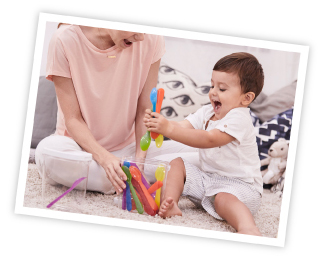Has your child thrown tantrums by kicking her way into the car seat or saying “no” to putting on her shoes?
Power struggles are a natural development as your toddler gains independence, but still lacks full communication and reasoning skills. During this phase, she begins to figure out that she’s her own person, separate from you. Opposing you is how she tests this idea and exerts her newfound independence and boundaries.
Fret not, mommy! Here are 7 easy ways to deal with challenging toddler behaviour.
SHOW YOUR EMPATHY.
Show her verbally you understand and are on her side. “I know you don’t feel tired enough for nap time.” “It makes you sad to leave the playground, doesn’t it?” This doesn’t mean you’ll give in, but it shows that you appreciate her side of things.
GIVE A WARNING BETWEEN ACTIVITIES.
Some kids do better when making transitions from one activity to another. If transitions are difficult, it can help when they know what’s coming next. Try using a timer: “When the bell rings, we’ll get ready for dinner.” Or set a limit: “Two more merry-go-rounds and then we’ll get into the car.” Be sure to follow through.
PHRASE IT WELL.
Avoid figures of speech that sound like you’re asking permission. “We have to go now, OK?” (So, of course, your toddler thinks, “Nah, not OK with me!”) Instead, try: “It’s time to go.”
OFFER LIMITED CHOICES.
Having input gives your toddler some control. They don’t have to be big decisions (like whether or not to nap)—it’s enough to be able to have a say in small matters: “Which three books should we read?” “Do you want the red cup or the green cup?” “OK one last playground activity: The slide or the swings?”
PHRASE IT WELL.
Avoid figures of speech that sound like you’re asking permission. “We have to go now, OK?” (So, of course, your toddler thinks, “Nah, not OK with me!”) Instead, try: “It’s time to go.”
OFFER LIMITED CHOICES.
Having input gives your toddler some control. They don’t have to be big decisions (like whether or not to nap)—it’s enough to be able to have a say in small matters: “Which three books should we read?” “Do you want the red cup or the green cup?” “Ok one last playground activity: The slide or the swings?”
BRING ON SOME IMAGINATION.
Bypass power struggles by turning a potential conflict into something fun. Make a game out of picking up toys; who can go the fastest? Create a race from the swings to the parking lot. Talk in a funny voice that engages your toddler to distract her from her dissatisfaction.
BRING ON SOME IMAGINATION.
Bypass power struggles by turning a potential conflict into something fun. Make a game out of picking up toys; who can go the fastest? Create a race from the swings to the parking lot. Talk in a funny voice that engages your toddler to distract her from her dissatisfaction.
KEEP “NO” TO A MINIMUM.
It would be easy to say no all day long to a toddler: "No" this, "no" that. Unfortunately hearing "no" all day long can trigger defiance. Of course, adults have to set limits to keep children healthy and safe. That’s why it works best to set up a "yes" environment that’s childproofed and safe to explore, so you don’t have to verbalize the "no" so often. Use distraction and redirection instead, or respond with humour. Save "no" for when it’s essential, and it will have more power when your child hears it.
ENCOURAGE WITH POSITIVE REINFORCEMENT.
It feels good to get good feedback. When you praise your child for behaviour that you like to see (putting away toys, remembering to touch a baby gently), you’re encouraging more of that cooperation in the future. Use positive encouragement often.
ENCOURAGE WITH POSITIVE REINFORCEMENT.
It feels good to get good feedback. When you praise your child for behaviour that you like to see (putting away toys, remembering to touch a baby gently), you’re encouraging more of that cooperation in the future. Use positive encouragement often.












